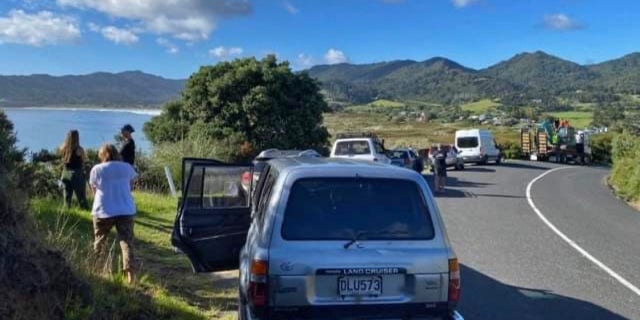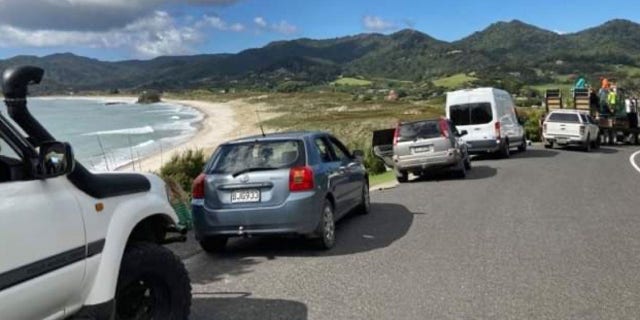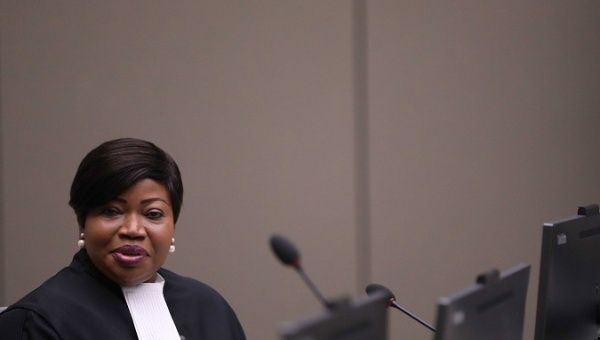JESUIT Pope Francis, Sistani Hold Milestone Interfaith Meeting in Najaf
ONLY A JESUIT COULD DO THIS
Saturday, 6 March, 2021 -


Asharq Al-Awsat
Iraq's Grand Ayatollah Ali Sistani met with Pope Francis in a historic meeting in the Iraqi city of Najaf on Saturday.
The meeting, on the second day of the first-ever papal visit to Iraq, marked a landmark moment in modern religious history, AFP reported.
The meeting lasted 50 minutes, with Sistani's office putting out a statement shortly afterwards thanking Francis, 84, for visiting the holy city of Najaf.
Sistani, 90, "affirmed his concern that Christian citizens should live like all Iraqis in peace and security, and with their full constitutional rights," it said.
His office also published an image of the two.
It took months of careful negotiations between Najaf and the Vatican to secure the one-on-one meeting.
"We feel proud of what this visit represents and we thank those who made it possible," said Mohamed Ali Bahr al-Ulum, a senior cleric in Najaf.
Sistani is followed by most of the world's 200 million Shiites -- a minority among Muslims but the majority in Iraq -- and is a national figure for Iraqis.
In 2019, he stood with Iraqi protesters demanding better public services and rejecting external interference in Iraq's domestic affairs.
"Ali Sistani is a religious leader with a high moral authority," said Cardinal Miguel Angel Ayuso Guixot, the head of the Pontifical Council for Interreligious Dialogue and a specialist in Islamic studies.
"The Najaf school has great prestige and is more secular than the more religious Qom school," Ayuso said.
"Najaf places more weight on social affairs," he added.
Saturday, 6 March, 2021 -


Asharq Al-Awsat
Iraq's Grand Ayatollah Ali Sistani met with Pope Francis in a historic meeting in the Iraqi city of Najaf on Saturday.
The meeting, on the second day of the first-ever papal visit to Iraq, marked a landmark moment in modern religious history, AFP reported.
The meeting lasted 50 minutes, with Sistani's office putting out a statement shortly afterwards thanking Francis, 84, for visiting the holy city of Najaf.
Sistani, 90, "affirmed his concern that Christian citizens should live like all Iraqis in peace and security, and with their full constitutional rights," it said.
His office also published an image of the two.
It took months of careful negotiations between Najaf and the Vatican to secure the one-on-one meeting.
"We feel proud of what this visit represents and we thank those who made it possible," said Mohamed Ali Bahr al-Ulum, a senior cleric in Najaf.
Sistani is followed by most of the world's 200 million Shiites -- a minority among Muslims but the majority in Iraq -- and is a national figure for Iraqis.
In 2019, he stood with Iraqi protesters demanding better public services and rejecting external interference in Iraq's domestic affairs.
"Ali Sistani is a religious leader with a high moral authority," said Cardinal Miguel Angel Ayuso Guixot, the head of the Pontifical Council for Interreligious Dialogue and a specialist in Islamic studies.
"The Najaf school has great prestige and is more secular than the more religious Qom school," Ayuso said.
"Najaf places more weight on social affairs," he added.
\
Earlier, Pope Francis met with President Barham Salih – who had extended the official invitation to the pontiff in 2019.
During his meeting with the Iraqi president, the Pope addressed a number of sensitive issues in Iraq.
“May the weapons be silenced (...). May there be an end to acts of violence and extremism,” he stressed, hoping for dialogue to prevail to give the country peace and development.
Following his visit to the grand ayatollah, the Pope will head to the desert site of the ancient city of Ur -- believed to be the birthplace of the Prophet Abraham, common patriarch of the Christian, Jewish and Muslim faiths -- where he will host an interfaith service, with many of Iraq's other religious minorities in attendance.
Earlier, Pope Francis met with President Barham Salih – who had extended the official invitation to the pontiff in 2019.
During his meeting with the Iraqi president, the Pope addressed a number of sensitive issues in Iraq.
“May the weapons be silenced (...). May there be an end to acts of violence and extremism,” he stressed, hoping for dialogue to prevail to give the country peace and development.
Following his visit to the grand ayatollah, the Pope will head to the desert site of the ancient city of Ur -- believed to be the birthplace of the Prophet Abraham, common patriarch of the Christian, Jewish and Muslim faiths -- where he will host an interfaith service, with many of Iraq's other religious minorities in attendance.
IN ANCIENT PAGAN
SUMERIAN CAPITOL CITY OF UR
BY NICOLE WINFIELD AND QASSIM ABDUL-ZAHRA ASSOCIATED PRESS
MARCH 06, 2021
PLAINS OF UR, IRAQ
Pope Francis and Iraq's top Shiite cleric delivered a powerful message of peaceful coexistence Saturday, urging Muslims in the war-weary Arab nation to embrace Iraq’s long-beleaguered Christian minority during an historic meeting in the holy city of Najaf.
Grand Ayatollah Ali al-Sistani said religious authorities have a role in protecting Iraq’s Christians, and that Christians should live in peace and enjoy the same rights as other Iraqis. The Vatican said Francis thanked al-Sistani for having “raised his voice in defense of the weakest and most persecuted” during some of the most violent times in Iraq’s recent history.
Al-Sistani, 90, is one of the most senior clerics in Shiite Islam and his rare but powerful political interventions have helped shape present-day Iraq. He is a deeply revered figure in Shiite-majority Iraq and his opinions on religious and other matters are sought by Shiites worldwide.
The historic meeting in al-Sistani’s humble home was months in the making, with every detail painstakingly discussed and negotiated between the ayatollah’s office and the Vatican.
Early Saturday, the 84-year-old pontiff, travelling in a bullet-proof Mercedes-Benz, pulled up along Najaf’s narrow and column-lined Rasool Street, which culminates at the golden-domed Imam Ali Shrine, one of the most revered sites in Shiite Islam. He then walked the few meters (yards) to al-Sistani’s modest home, which the cleric has rented for decades.
A group of Iraqis wearing traditional clothes welcomed him outside. As a masked Francis entered the doorway, a few white doves were released in a sign of peace. He emerged just under an hour later, still limping from an apparent flare-up of sciatica nerve pain that makes walking difficult.
The “very positive” meeting lasted a total of 40 minutes, said a religious official in Najaf, who spoke on condition of anonymity because he was not authorized to brief media.
The official said al-Sistani, who normally remains seated for visitors, stood to greet Francis at the door of his room — a rare honor. Al-Sistani and Francis sat close to one another, without masks. Al-Sistani, who rarely appears in public — even on television — wore black robes and a black turban, in simple contrast to Francis’ all-white cassock.
The official said there was some concern about the fact that the pope had met with so many people the day before. Francis has received the coronavirus vaccine but al-Sistani has not.
The pope removed his shoes before entering al-Sistani's room. Al-Sistani spoke for most of meeting. Francis was served tea and a plastic bottle of water, but only drank the latter. Francis paused before leaving al-Sistani’s room to have a last look, the official said.
The pope arrived later in the ancient city of Ur for an interfaith meeting aimed at urging Iraq’s Muslims, Christians and other believers to put aside historic animosities and work together for peace and unity. Ur is the traditional birthplace of Abraham, the biblical patriarch revered by Christians, Muslims and Jews.
“From this place, where faith was born, from the land of our father Abraham, let us affirm that God is merciful and that the greatest blasphemy is to profane his name by hating our brothers and sisters," Francis said. “Hostility, extremism and violence are not born of a religious heart: they are betrayals of religion.”
Religious leaders stood to greet him. While Francis wore a mask, few of the leaders on the tented stage did. The meeting was held in the shadow of Ur’s magnificent ziggurat, the 6,000-year-old archaeological complex near the modern city of Nasiriyah.
The Vatican said Iraqi Jews were invited to the event but did not attend, without providing further details. Iraq's ancient Jewish community was decimated in the 20th century by violence and mass emigration fueled by the Arab-Israeli conflict, and only a handful remain.
The Vatican said the historic visit to al-Sistani was a chance for Francis to emphasize the need for collaboration and friendship between different religious communities.
In a statement issued by his office after the meeting, al-Sistani affirmed that Christians should “live like all Iraqis, in security and peace and with full constitutional rights." He pointed out the "role that the religious authority plays in protecting them, and others who have also suffered injustice and harm in the events of past years.”
Al-Sistani wished Francis and the followers of the Catholic Church happiness, and thanked him for taking the trouble to visit him in Najaf, the statement said.
For Iraq’s dwindling Christian minority, a show of solidarity from al-Sistani could help secure their place in Iraq after years of displacement — and, they hope, ease intimidation from Shiite militiamen against their community.
Iraqis cheered the meeting of two respected faith leaders.
”We welcome the pope’s visit to Iraq and especially to the holy city of Najaf and his meeting with Grand Ayatollah Ali Al-Sistani,” said Najaf resident Haidar Al-Ilyawi. “It is an historic visit and hope it will be good for Iraq and the Iraqi people.”
Francis arrived in Iraq on Friday and met with senior government officials on the first-ever papal visit to the country. It is also his first international trip since the start of the coronavirus pandemic, and his meeting Saturday marked the first time a pope had met a grand ayatollah.
On the few occasions where he has made his opinion known, the notoriously reclusive al-Sistani has shifted the course of Iraq's modern history.
In the years after the 2003 U.S.-led invasion he repeatedly preached calm and restraint as the Shiite majority came under attack by al-Qaida and other Sunni extremists. The country was nevertheless plunged into years of sectarian violence.
His 2014 fatwa, or religious edict, calling on able-bodied men to join the security forces in fighting the Islamic State group swelled the ranks of Shiite militias, many closely tied to Iran. In 2019, as anti-government demonstrations gripped the country, his sermon lead to the resignation of then-prime minister Adil Abdul-Mahdi.
Iraqis have welcomed the visit and the international attention it has given the country as it struggles to recover from decades of war and unrest. Iraq declared victory over the Islamic State group in 2017 but still sees sporadic attacks.
It has also seen recent rocket attacks by Iran-backed militias against U.S. military and diplomatic facilities, followed by U.S. airstrikes on militia targets in Iraq and neighboring Syria. The violence is linked to the standoff between the U.S. and Iran following the Trump administration's withdrawal from the 2015 nuclear accord and its imposition of crippling sanctions on Iran. President Joe Biden has said he wants to revive the deal.
Francis’ visit to Najaf and nearby Ur traverses provinces that have seen recent instability. In Nasiriyah, where the Plains of Ur is located, protest violence left at least five dead last month. Most were killed when Iraqi security forces used live ammunition to disperse crowds.
Protest violence was also seen in Najaf last year, but abated as the mass anti-government movement that engulfed Iraq gradually petered out



6 of 26
The Pope caravan arrives to meet Shiite Muslim leader Grand Ayatollah Ali al-Sistani in Najaf, Iraq, Saturday, March 6, 2021. Pope Francis arrived in Iraq on Friday to urge the country's dwindling number of Christians to stay put and help rebuild the country after years of war and persecution, brushing aside the coronavirus pandemic and security concerns to make his first-ever papal visit. (AP Photo/Anmar Khalil) ANMAR KHALIL AP
The Pope caravan arrives to meet Shiite Muslim leader Grand Ayatollah Ali al-Sistani in Najaf, Iraq, Saturday, March 6, 2021. Pope Francis arrived in Iraq on Friday to urge the country's dwindling number of Christians to stay put and help rebuild the country after years of war and persecution, brushing aside the coronavirus pandemic and security concerns to make his first-ever papal visit. (AP Photo/Anmar Khalil) ANMAR KHALIL AP
Pope Francis, right, meets with Iraq's leading Shiite cleric, Grand Ayatollah Ali al-Sistani in Najaf, Iraq, Saturday, March 6, 2021. The closed-door meeting was expected to touch on issues plaguing Iraq's Christian minority. Al-Sistani is a deeply revered figure in Shiite-majority Iraq and and his opinions on religious matters are sought by Shiites worldwide. (AP Photo/Vatican Media) VATICAN MEDIA AP
An aerial photo shows the 6,000-year-old archaeological site of Ur amid preparations for Pope Francis' visit near Nasiriyah, Iraq, Saturday, March 6, 2021. Pope Francis arrived in Iraq on Friday to urge the country's dwindling number of Christians to stay put and help rebuild the country after years of war and persecution, brushing aside the coronavirus pandemic and security concerns to make his first-ever papal visit. (AP Photo/Nabil al-Jourani) NABIL AL-JOURANI AP
Pope Francis, center, listens during an interreligious meeting near the archaeological site of Ur near Nasiriyah, Iraq, Saturday, March 6, 2021. Pope Francis and Iraq's top Shiite cleric delivered a powerful message of peaceful coexistence Saturday, urging Muslims in the war-weary Arab nation to embrace Iraq’s long-beleaguered Christian minority during an historic meeting in the holy city of Najaf. (AP Photo/Nabil al-Jourani) NABIL AL-JOURANI AP













:focal(1375x371:1376x372)/https://public-media.si-cdn.com/filer/27/51/2751bfec-c7ca-4ad4-99b2-439dc19f0aa9/fmars-08-633582-g003.jpg)


